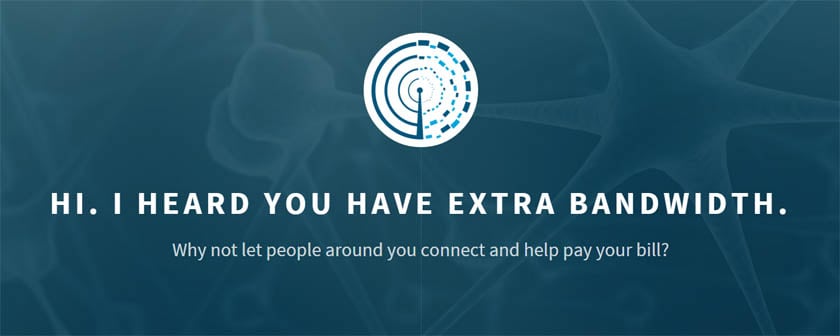
Unless you’re a programmer, you’re unlikely to spend all day online, but you still pay a monthly fee for full-time internet access. Now imagine if you could monetize your network by sharing it with neighbors or passersby and receive payment without any need to share personal information or communicate directly.
This idea is hardly new, but it’s never come to widespread fruition because of the lack of adequate rewards for individuals selling access to their networks without revealing personal details and that’s where BitMesh wants to step in by allowing you to receive Bitcoin micro-payments in exchange for sharing your bandwidth.
HOW IT WORKS
If you’re running the BitMesh software your network will appear as open to anyone who’s looking, but once they’re connected and try to access any website, they’ll be redirected to what is known as a captive portal, which is essentially a landing page where they’ll receive instructions about how to pay for time increments (BitMesh is very flexible in this regard, working with 5 second increments of time, which is one of the reasons the technology fits so well with the cryptocurrency scheme) and in future versions, you’ll also be able to set payments for specific bandwidth limits, in case you want to avoid someone else hogging your resources.
Today the company released an update video showing a working prototype without an UI and they’re expected to release a demo soon.
ABOUT THE COMPANY
The BitMesh project is the brainchild of Andrew Donley (has worked previously for LG, Samsung and Shop.com), was co-founded with Christian Lunoe (comScore Payments Practice Leader) as Business and Operations advisor and Chris Smith as Technical Advisor . Donley had toyed with the idea of a meshnet before and tried to set it up in Santa Cruz, but at the time his team couldn’t figure out an easy way to properly incentivize users into share their networks.
The main hurdle at the time was that most online payment systems either required constant oversight or had fees so high that they negated the profits from micro transactions, which meant that time online would have to be sold in bigger blocks rather than only paying for what you used. When Donley learned about Bitcoin, he knew he had stumbled upon the solution to the payments dilemma.
For more up to date news on their progress, you can follow BitMesh’s twitter account here or check out their GitHub repository for proof of concept.
Prototype demo coming Monday! Join our mailing list to see it first: http://t.co/ytFYbQHx05
— BitMesh Network (@BitMeshNetwork) March 27, 2015







